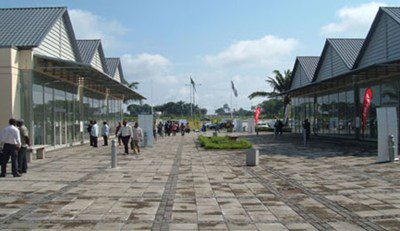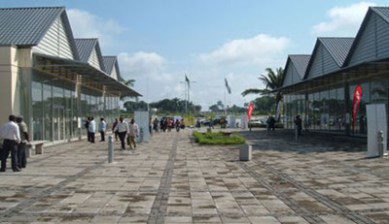National Issues
Tinapa Resort as a modern-day trojan horse -By Ime Henshaw

In the legend of the Trojan Horse, the Greeks, after a fruitless 10-year siege on the city of Troy, devised a subterfuge. They constructed a wooden horse in which they hid some of their best fighters outside the city gate and pretended to retreat.
The Trojans, taken in by the move, soon dashed outside the gate to pull in the wooden horse as a war booty with great rejoicing. At night the Greek fighters emerged from the wooden horse to open the gate for a rampaging Greek army to sweep to victory.
The Tinapa Resort is like the Trojan Horse in as much as it was presented to the people of Cross River State as a potential booty, a boon to their long-suffering people, by its former Governor Donald Duke, who conceived and midwifed the project. With Tinapa as the decoy, the doors were opened to contractors and sundry businessmen and companies that made profit. In the end, instead of Cross River to gain as well, it wss left with a multi-billion naira debt burden on account of Tinapa.
But what was the promise? Duke held up Tinapa as the magic wand that would generate investments and jobs while rivalling Dubai as a tourist destination, all in one breath. “We want to build the 24 kilometer high-speed monorail to link Tinapa,” Duke had chirped at the beginning. “My vision is that by year 2010, Cross River State will be the centre of tourism in Nigeria and that explains why our investment in tourism in the last four years has been the highest in West Africa.”
Duke did go a bit further to try to outline this vision in more concrete terms: “Tinapa is free trade zone that will have a lot of facilities akin to what is in advanced countries. We’ll have massive super stores like Walmart. It’ll have Casinos, recreation parks and other facilities that will make it unnecessary for Nigerians to want to travel abroad for vacations. How it will work is that as soon as passengers alight from the plane, they get into the monorail and from there straight to Tinapa Resort.”
How was Tinapa funded? From 2005 to 2006 a total of more than 600 million naira was withdrawn from the local governments account run jointly with the state government for the purpose of funding Tinapa. Initially it was estimated that the project would cost 25 billion naira and then later escalated to 65 billion naira. Money accruing to the state from federal allocations was deployed as well on the project in addition to additional debt in the form of bonds sold to the public and loans taken from banks to fund it. Ultimately more than $600 million is estimated to have been expended on the Tinapa project.
Seven years later after Tinapa’s establishment, what happened to the vision? Nothing. It was stillborn, never quite flew despite all the stage-managed applause. The prime beneficiaries appear to be those who won the contracts to build Tinapa. Obviously much thought didn’t go into building it. The cart went well ahead of the horse.
Where did you ever supply a good long before demand is anticipated talk less being effective? Industries needed to be in existence and thriving before you could cluster them into a free trade zone to take advantage of better terms. Therefore, such a project might have been more viable in the Lagos axis with proven industrial capacity rather than sleepy Calabar. Where was the rail network heading into the western bulge of Africa with goods from the Tinapa free zone, or heading north in the direction of Chad (the route Charles Taylor took) laden with Tinapa goods.
Among the many fuzzy headed issues surrounding the project is the fact that the structure of its original ownership remains unclear. Whether Tinapa was public or a private investment was never quite made clear and the terms under which funds belonging to Cross River State local governments got sunk into the venture were never made clear.
The consequences of such deliberately poor vision is that today the Tinapa Resort is a lonely desolate place, of no good to anyone. It has been handed over to an undertaker called AMCON for the purpose of disposal. Of course, the people of Cross River State never needed a resort where they would shop. They have more pressing needs. How anyone could conceive such a waste as a solution to their problems defies logic. Think about the opportunity costs $600 million would have given the citizens of the state in new schools, hospitals, roads, scholarships for its students, school feeding in the rural areas, dispensaries and health centres in the more remote areas, agricultural extensions services for poor farmers to help boost their productivity. It is only then that the true scope of the Tinapa tragedy leaps into view.





















Ochayi
December 9, 2014 at 11:56 am
The story of Tinapa is a sad tale characteristic of the Nigerian empire.My brother don’t be surprised. Tinapa was designed such that goods imported into the area will be free from tax and custom dues.The benefit for Calabar and Nigeria was the jobs and patronage that will be created in the area. Donald Duke conceived a wonderful idea but he needed a legal backing at the federal level to amend CUSTOM ACT at the National Assembly. The act if amended needed to incorporate FREE TRADE ZONE without which any goods imported into the country must pay custom duty to Nigerian Custom Service or it will be impounded. Donald Duke fought for this amendment which never came from the redundant National Assembly. For this reason, Tinapa could not take off as conceived, hence the debacle.This is the noble course that our dishonourable members of National Assembly should be concerned with rather than passing gay laws, impeachment notice and the likes.